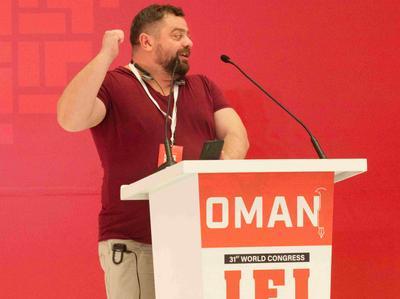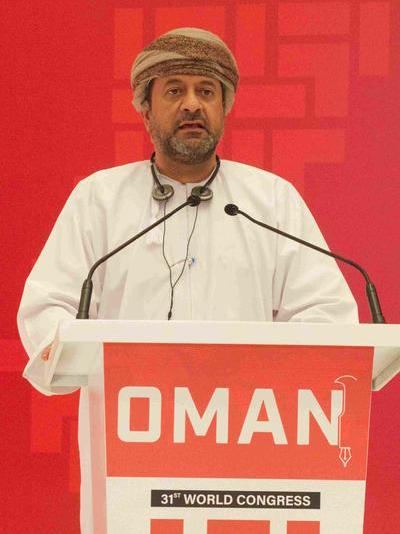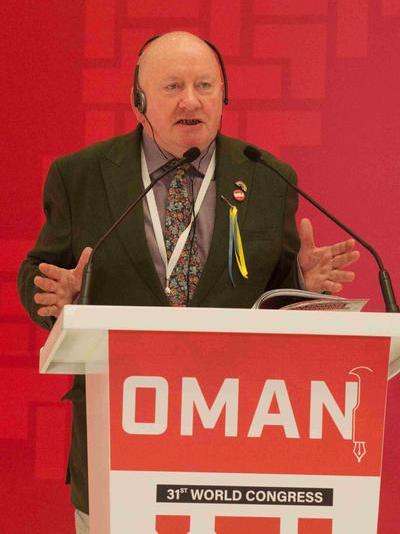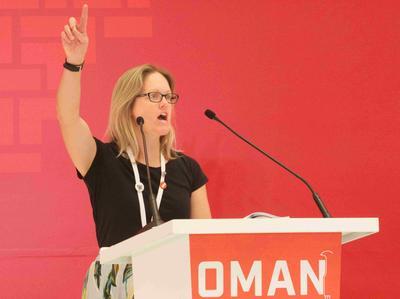Heat and light – the IFJ in Oman gives hope to Ukrainian journalists
NUJ delegate Tim Dawson offers a personal reflection on an eventful IFJ World Congress in Oman.
Taking the stage as she assumed the presidency of the International Federation of Journalists (IFJ) Dominique Pradalié said: “I want to be a president for everyone – those who voted for me and those who didn’t. We have to build unity, for the sake of journalism.”
Whether Pradalié, formerly general secretary of SNJ (France), can make good her ambition is for the future. It was an apt conclusion, however, to a democratic gathering where, inevitably, not everyone got their way.
The Congress, held over three days, took place in Oman’s premier conference venue, on the outskirts of Muscat. More than 250 participants from 92 countries met to: determine the Federation’s direction for the next three years; consider its work over the previous three; and elect a new executive. Day-time temperatures rarely fell below 40º centigrade; predictably few delegates stepped beyond the air-conditioning.
The NUJ’s NEC member Jim Boumelha, a part of the IFJ’s leadership for nearly two decades was challenged for the treasurership by Mogens Blicher Bjerregård from Denmark, currently President of the European Federation of Journalists. It was the most senior contested position at the meeting. Boumelha emerged ahead 165 votes to 107 – a displacement of support that was replicated over several opposed motions.
There were matters on which the world’s journalists united without equivocation. On the conflict in Ukraine, the IFJ condemned with one voice, Russian attempts to create a false narrative and bend its domestic media to the war effort.
Delegates condemned spying on journalists’ phones with software such as Pegasus. The NUJ’s call for the UK’s national safety plan for journalists to be replicated elsewhere was unanimously adopted. So too was the demand that Julian Assange be released.
NUJ delegate Sian Jones made an impassioned plea for more work to free jailed journalists – and was rewarded with enthusiastic acclaim. Indeed, all the motions proposed by the UK and Ireland received similar support. Jones also participated in a panel on ‘winning in workplaces’ in which she spoke about the NUJ’s successful prosecution of Samira Ahmed case against the BBC.
A proposal to give the IFJ’s Gender Council an automatic seat on the organisation’s Executive was the subject of lengthy procedural wrangling. When put to the vote, however, it was adopted without opposition.
Serhiy Shturkhetskyy from the Independent Media Worker’s Union of Ukraine (IMWUU) was Congress’ break-out star. A 44-year-old first-time delegate with limited English, he did not need to win over the gathering to his cause. The ebullience and enthusiasm he brought to his advocacy, however, captured the essence of his country’s resistance for the many delegates who met and congratulated him.
Congress’ staging was lavish and glitzy (and entirely alcohol-free). Delegates gathered in a hall with the floorspace of a hypermarket and the height of a two-story house. Scores of traditionally-dressed functionaries flitted about, and, camera operators caught every moment from multiple angles.
Allan Boye Thulstrup from the Danish Journalists’ Union asked why the IFJ had chosen to meet in a country with a questionable track record on human rights and free expression. The Chairman of the Omani Journalists Association, Dr Mohammed Al-Amairi responded that “not a Euro had come from the Sultanate of Oman”. Funding had, instead been raised from civil society sponsorship. It was certainly true that bodies such as the Omani Development Agency and the Omani Tourism Authority went to great lengths to impress delegates with their work. Nonetheless, it was sponsorship on a scale of which western unions could only dream.
Séamus Dooley, NUJ assistant general secretary raised the issue of rights for gay people in Oman with such potency that reduced several in the audience to tears. A representative of the Sultanate’s government afterwards offered the NUJ an immediate meeting to discuss the issue.
The scale of this year’s event certainly throws down a gauntlet to the French. They will host the 32nd Congress, scheduled for early 2026 to coincide with the centenary of the IFJ’s founding Congress in Paris. Its inaugural president, and guiding presence in the early days, was Georges Bourdon – like Pradalié, a former general secretary of the SNJ.
The social program was as striking as the venue. On the final night, a lavish cast staged what was described as ‘a traditional Omani nuptial ceremony’. The event included a spectacularly bejewelled bride, a troop of dancing Zanzibarian drummers, a bagpiper and models wielding assault rifles. It was a unique spectacle that offered a fresh, high-calibre focus, to the concept of a shot-gun wedding.
There is something magical about being in a space with such a diverse range of journalists’ representatives. Nonetheless, most delegates probably experience moments when ‘the IFJ way of doing things’ seems alien to their own union’s customs. Proceedings frequently court chaos – notwithstanding the efforts of NUJ president Pierre Vicary who chaired much of the gathering. Looming pandemonium in no way invalidates the import of business concluded, however.
Reports received by Congress left no doubt about the value of the IFJ’s work – in Afghanistan, Ukraine, on impunity, surveillance and a raft of other areas. All would be diminished without the democratic authority that Congress bestows.
Perhaps that sounds nebulous? Before Shturkhetskyy returned to Ukraine, however, he cast the federation’s work in concrete terms.
Shturkhetskyy said:
“Thank you IFJ, for all the help that you have given to my union and to my country. The conditions suffered by my members are intolerable and knowing that we are part of an international family is one of the things that keeps us going.”

Serhiy Shturkhetskyy, Independent Media Workers of Ukraine
© Tim Dawson

Dr Mohammed Al-Amairi, chairman of the Omani Journalists Association
© Tim Dawson

Séamus Dooley, NUJ assistant general secretary
© Tim Dawson

NUJ delegate Sian Jones
© Tim Dawson
